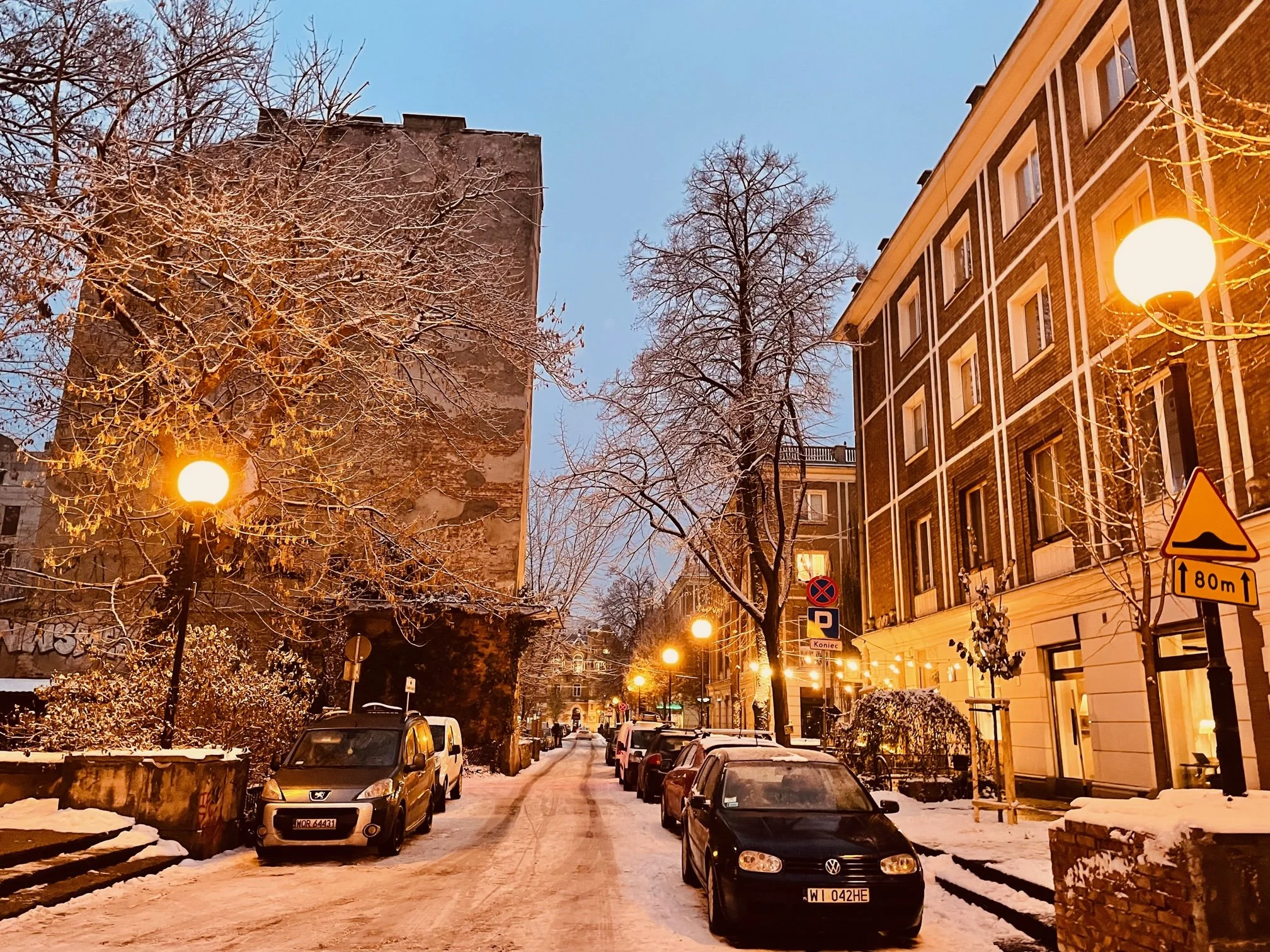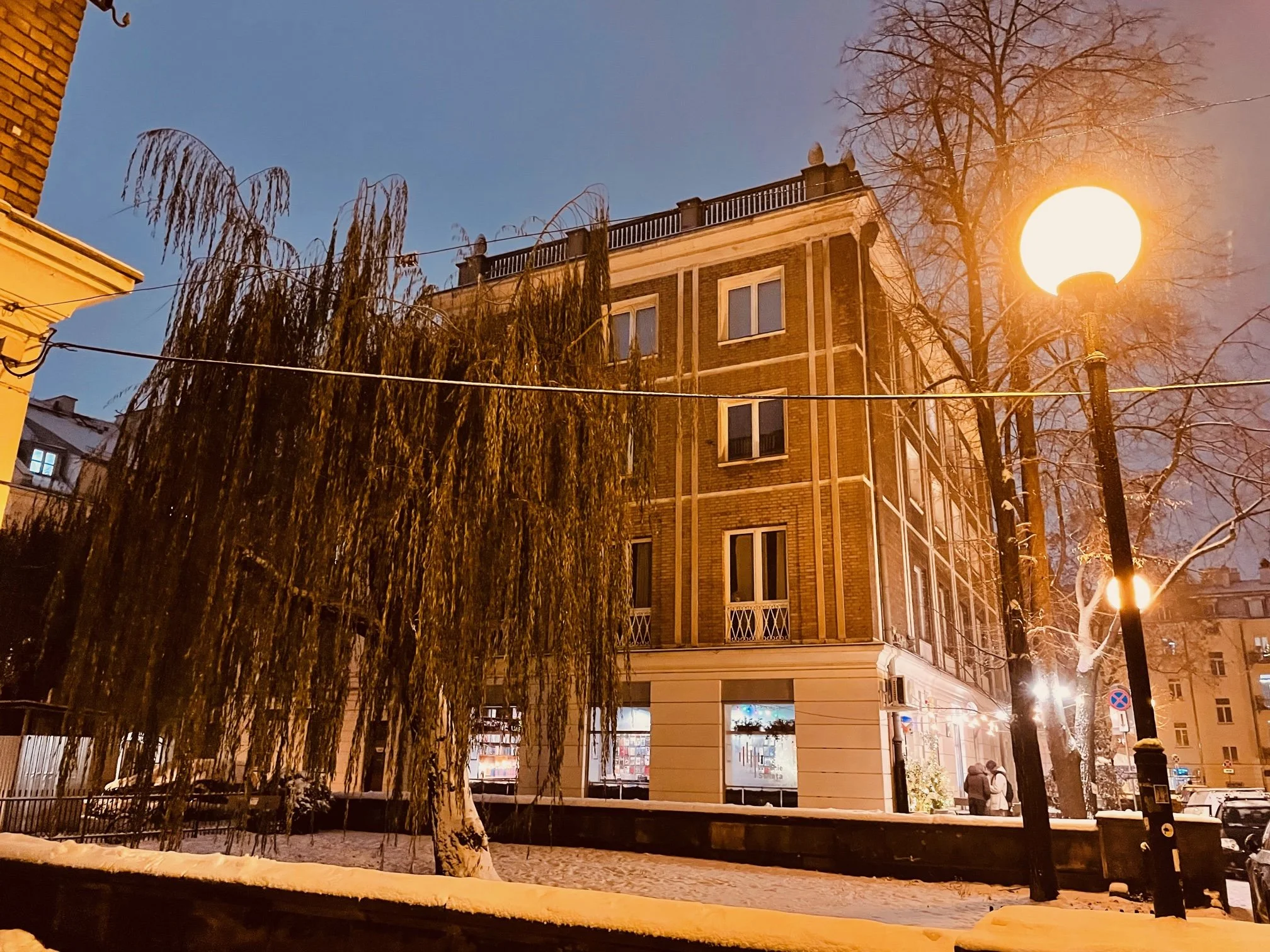(Greetings)
When I entered I saw the famous writer in his usual world, the bookstore cafe that he also owns, my favorite place in Warsaw. I saw him and nodded a hello of some kind, but wasn’t too aggressive with it because he was at a table in conversation with a woman. Probably book business. So I went to the counter to order something. Then I realized the writer had gotten up and followed me there, because now he was standing before me, over me practically, and looking deeply into my eyes. “Czesc Mariusz,” I greeted him. He kept staring. Then it became clear he was just trying to figure out who the hell I was.
“Jan,” I said.
Another second. Then, “Ahhhhh! Hej!!!” And he threw his arms out wide and hugged me.
At exactly this moment, the manager of the cafe arrived at the scene, and hugged me also. Said something about it being so long. How long? he asked. Well, I’ve been in the States for awhile, I told them both.
“Ah, New York?” the writer wondered. “You came from New York with this bag?” A gym duffel was over my shoulder. And recalling this now, I still don’t know if he was joking, or if he really thought I had just arrived, come straight from the airport to the cafe — and traveled only with a duffel bag.
“No no,” I said. “I was in Los Angeles. And I had more than this bag.”
“Ah, Los Angeles! Soon I’ll be going to New York.”
I asked him when (I don’t know why), and he told me when, and for how long.
Ah great, I said. (Because what else to say.)
Then the writer asked: “Is Babcia still alive?”
I said yes.
“That’s great!”
“How old now?”
“Well, in a couple weeks, she’ll be 94.”
“Beautiful!”
We parted then, the writer and the manager and me, and I turned to the counter. Decided to order wine rather than coffee.
~
I found myself thinking about this interaction then at the table, with my wine and my book (pretending to read it, but only thinking). I was thinking about it still on the long walk home through the snow-covered city. And even now I’m thinking about it, early this next morning with my coffee, which is why I’m writing. Writing for me sometimes is trying to figure out what I think.
And I think this is what’s happening: I’m analyzing and maybe overanalyzing. Analyzing basic, everyday functions and interactions. And maybe because it’s like I’m finding my way into them again. Learning them again. All the time I have this sense that I’m not standing where I’m standing. That I’m not “in the moment,” as people say, but observing the moment. Trying to fit into it somehow; but trying can also mean I’m not really there. That I’m only there acting. Trying to play a role.
~
First, what I really liked:
Mariusz the famous writer not acting, not pretending. He couldn’t place me, which happens, and probably especially in his busy world. But when this happens, people usually pretend they know. They say Oh hey, hi, how’s it going, all the while searching in their brain for: Who.
But him coming right up to me, and staring at me in that way, and trying to figure me out like that: that was honesty. (Probably that honesty is what makes him a good writer.)
I liked also the warmth of his hug, as well as the cafe manager’s hug and demeanor always. It’s part of the reason why I like the place: there is a genuine warmth to the people there. A warmth like the glow of the lamps on the quiet street outside, or the books all around on the shelves; books and good people always warm a place in winter more than the heat.
~
Now, what I didn’t like:
Me.
And the countless calculations I was making while the conversation was happening. (Should I say why I was in L.A.? … Wait, maybe they’ll ask. Or wait, maybe they see something of it on me. … No, no don’t say anything. But wait—)
“Is Babcia still alive?” he wondered.
Yes. (But—)
“That’s great!”
(Right, but—)
Calculations. Being in two spaces at once. Within a conversation but also deep within your mind. Within those parentheses rather than just out there in the sentences being traded on the outside. Inside, within the parentheses, I was saying:
(Yes she’s still alive, but you know who isn’t? That’s why I’ve been gone. Actually we just had the funeral.)
Or:
(Yes, 94. Is it great? I think so, too, but Babcia tells me every day that it isn’t. That it’s awful. That the aches and annoyances of it aren’t worth it anymore. And she tells me every day that she probably won’t be here tomorrow. So: more cleaning. Every day it’s this talk about dying, and pain, and needing more porzadek, order, cleaning. So is this beautiful?)
It feels helpless sometimes, living inside of parentheses as well as outside. It makes me tired. Not knowing what to say, how to say it, and to whom. It’s exhausting, not knowing of late whether to say nothing or everything. A text arrives on my phone asking, Are you doing better now? And I stand there calculating whether to write back the answer he’s probably hoping for, or the truth. I remember how in school, math would often make me go to sleep, and here it’s similar. I mean yesterday, even going to Wrzenie Swiata (The Boiling World), that cafe, was a calculation. Earlier I had calculated: put yourself in a place you usually love. Maybe something will happen. Maybe it will help?
It wasn’t simply: I’m going to Wrzenie, because I want to go to Wrzenie. With no calculation or question, no motive other than just to be there.
Being there — it’s hard.
Being at Wrzenie yesterday was more me sending in the actor who would play me. To do as I used to: maybe chat a bit with a barista, say hello to one or two familiar faces, smile, sit, drink coffee, read for a bit. Enjoy the company of atmosphere.
But the only thing really honest about what happened was when the star of that stage was perplexed by this new extra, who’d come in out of the cold. And his pointed attempt, then, to remember where he’d seen him.
It may have further confused the scene inside — and some other people there — when I later took off my jacket and winter hat before sitting down, revealing my bald head. Back when I used to sit at the cafe all the time, my head was almost always covered by big hair, then receding hair, or a hat. But there I was now, and nothing, a head like a thumb. And between sips of wine or looks up from the book I wasn’t reading, I did notice some double-takes or longer looks from some of those other familiar faces — people I’d see once in awhile, enough to know their faces but not enough to know their names. And I could see they, too, eyeing me curiously sometimes just as the writer had: wait. Who? From where?
(“I had hair in the last film. Or a hat,” I wanted to say, to ease their mind. But I said nothing, said it only in here.)
~
Bridging this distance between these two places, these people — the inner self and the outer, the person and the stand-in — is the challenge.
Figuring my way out of the parentheses and into being; into just saying it rather than giving the lines I think I should say or read from the script — is the challenge.
I’d like to say it’s the grief that’s the culprit for all this, but I know that’s also not true. What’s true is that I struggle with this always — this sense of not being where I am, of almost watching myself in the theatre of life, and often looking around and thinking: Wow, these people are really living.
I’ve always been more observer than partaker. It’s how I’m wired. It’s probably why I write. But now especially, I feel so removed. From the people and the places.
And I wonder: when will I just be there, here again? How long will the journey take, back to myself? And if I do get there, if I meet him again, will we even recognize each other at the end of this road?
Maybe I’ll be the one then coming up and staring, just staring deeply, trying to place him.
Related:

